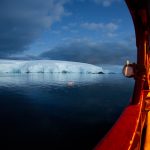 August 28, 2020 9:30 am
Published by Climate Extremes
August 28, 2020 9:30 am
Published by Climate Extremes
High resolution ocean modelling has found the world’s strongest ocean currents, which play key roles in fisheries and ocean ecosystems, will experience more intense marine heatwaves than the global average over coming decades.
 July 2, 2020 7:00 pm
Published by Climate Extremes
July 2, 2020 7:00 pm
Published by Climate Extremes
The first comprehensive worldwide assessment of heatwaves down to regional levels has revealed that in nearly every part of the world heatwaves have been increasing in frequency and duration since the 1950’s. The research has also produced a new metric, cumulative heat, which reveals exactly how much heat is packed into individual heatwaves and heatwave seasons.
 April 28, 2020 3:06 pm
Published by Climate Extremes
April 28, 2020 3:06 pm
Published by Climate Extremes
New study finds ocean heat asymmetry between hemispheres can be explained by natural variability in the climate system superimposed on long-term ocean warming.
 July 9, 2019 9:00 am
Published by Climate Extremes
July 9, 2019 9:00 am
Published by Climate Extremes
Climate scientists testing a new mathematical and statistical method that converts projections of future climate outcomes in a warming world into reliable probabilities have found there is a significant chance the Arctic could be ice-free even if world leaders meet the Paris targets of 1.5°C and 2°C.
 June 15, 2019 7:16 am
Published by Climate Extremes
June 15, 2019 7:16 am
Published by Climate Extremes
An international team, led by Australian researchers from the ARC Centre of Excellence for Climate Extremes (CLEX) and the Institute for Marine and Antarctic (IMAS) studies, have published in Nature Communications the first global assessment of the major drivers of marine heatwaves.
 May 29, 2019 2:02 pm
Published by Climate Extremes
May 29, 2019 2:02 pm
Published by Climate Extremes
New work published in Nature Communications develops a correction method that ensures the probability of climate extremes in the model simulations are consistent with real-world observations. In addition, it also corrects the rate of the long-term changes and the inter-annual variability so that it is consistent with observations.
 January 18, 2019 10:43 am
Published by Climate Extremes
January 18, 2019 10:43 am
Published by Climate Extremes
Antarctic sea ice extent underwent a rapid decline in the spring of 2016 and is still well below average now. CLEX researchers have tied the decline to natural variability of both the atmosphere and ocean in two articles published in Nature Communications this month.







